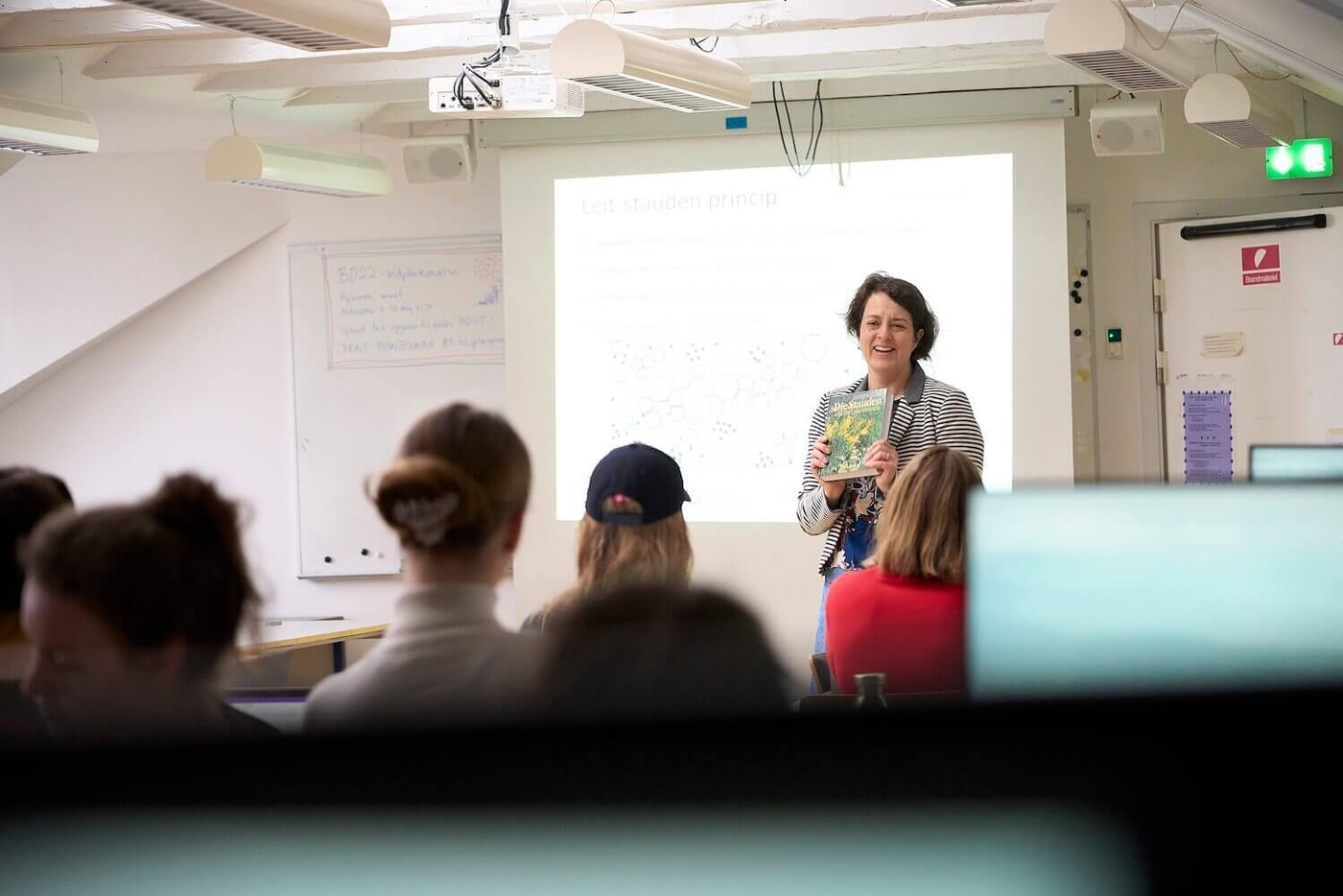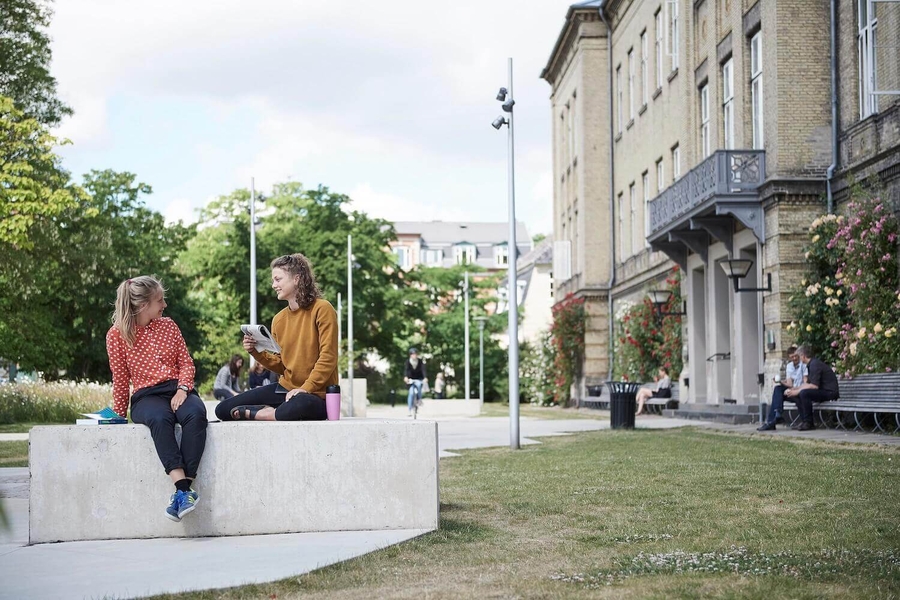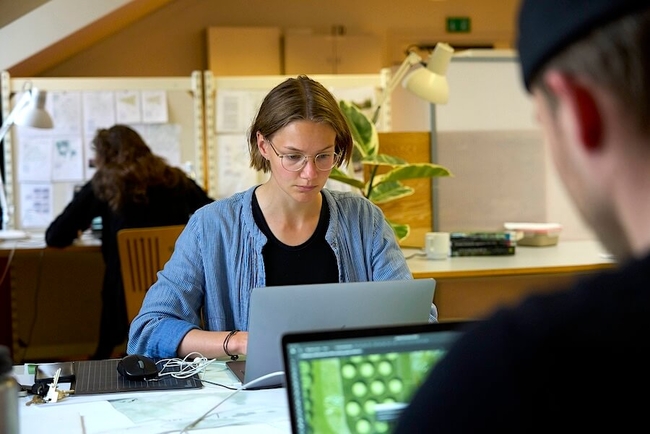About the programme
Considering studying at UCPH this September?
Apply by 15 January if you are an applicant from outside the EU/EEA/Switzerland. Apply by 1 March if you are from the EUAdmission and application
To apply for admission to this master's degree programme, you must have completed a qualifying bachelor’s degree or a similar Danish or international degree programme which is assessed to be relevant. Apply for admission via the application portal.
Below, you can read more about admission requirements and which documents to upload in the application portal.
Academic admission requirements
Here you'll find the different academic requirements depending on which qualifying degree you hold.
With a Bachelor's degree in
- Landscape Architecture from University of Copenhagen
you are granted legal right of admission and guaranteed a place on the Master’s programme in Landscape Architecture if you apply in time to begin within 3 years of the completion of your Bachelor’s degree.
You meet all academic requirements if you hold one of the degrees listed below. Learn about when and how to apply. Note, however, that you still need to document that you meet the programme's language requirements.
Bachelor's degree in
- Landscape Architecture (landskabsarkitektur) from University of Copenhagen (note, that if you apply in time to begin within 3 years of the completion of your Bachelor’s degree, you have legal right of admission to the Master's programme)
- Architecture from Royal Danish Academy of Fine Arts
- Architecture from Aarhus School of Architecture
- Engineering (Architecture and Design with specialisation in Architecture and Urban Design) from Aalborg University
Professional Bachelor's degree in
- Forest and Landscape Engineering (skov- og landskabsingeniør) from University of Copenhagen
- Urban Landscape Engineering from Zealand Institute of Business and Technology
- Urban Landscape Engineering from Business Academy Aarhus
Additionally, you are encouraged to submit an annotated electronic portfolio of design projects/artwork of 15 pages demonstrating an ability to design with IT tools such as Adobe, CAD and/or 3D programs as this is an important criterion in the prioritisation of applicants.
If you have a Bachelor’s degree other than those listed above, you must submit additional documentation along with your application so we can evaluate whether or not you meet the admission requirements. Learn about when and how to apply.
If you have a Bachelor’s degree, Professional Bachelor's degree or equivalent from Danish or international universities you are qualified for admission if your programme includes the following:
Design: A minimum of 60 ECTS credits within design courses such as these courses from the Faculty of Science:
- Plan og design 1 and Plan og design 2 (Planning & Design 1 + 2)
- Håndværk og æstetik i landskabsarkitektur - Studio (Practice & Aesthetics in Landscape Architecture - Studio)
- Beplantningsdesign (Planting Design)
- Byplanstudio – Strategi og design 1 and Byplanstudio – Strategi og design 2 (Urban Planning Studio 1 + 2) orPlanter og teknologi i landskabsarkitektur 1 and Planter og teknologi i landskabsarkitektur 2 (Plants and Technology in Landscape Architecture 1 + 2)
Ecology (Økologi): A minimum of 15 ECTS credits within ecology courses such as these courses from the Faculty of Science:
- Naturgrundlaget 1 – Planter og landskab (Processes in Nature 1 - Plants and Landscape)
- Naturgrundlaget 2a – Vegetationer og bioressourcer (Natural Resources 2A - Vegetation and Bioresources)
- Naturgrundlaget 2b – Vegetation og økologi (Natural Resources 2B - Vegetation and Ecology)
- By og landskabsplanters botanik (Botany of Urban and Landscape Plants)
Philosophy of Science (Videnskabsteori): A minimum of 7.5 ECTS credits of courses from The Faculty of Science such as:
- Fagets videnskabsteori - landskabsarkitektur (Philosophy of Science - Landscape Architecture)
- Skrive- og projektværksted – selvvalgt emne i landskabs- og bystudier (Project Writing Studio – Topics in Landscape and Urban Studies)
- Landskabsarkitekturens historie, nutid og fremtid (Landscape Architecture History)
Additionally, you are encouraged to submit an annotated electronic portfolio of design projects/artwork of 15 pages demonstrating an ability to design with IT tools such as Adobe, CAD and/or 3D programs as this is an important criterion in the prioritisation of applicants.
We may also admit applicants who, after an individual academic assessment, are deemed to possess educational qualifications equivalent to those required above.
Qualifying degree and other courses/projects
When we assess whether you meet the admission requirements for the Master's degree program, Danish legislation only allows us to assess your Bachelor's degree. Consequently, you cannot study supplementary courses between Bachelor's and Master's degree programs in order to meet the admission requirements.
If you have passed courses/projects before you complete the qualifying Bachelor's degree, these can be included in the assessment, even though they are not part of the Bachelor's degree program.
- It applies to courses/projects you have taken as single subjects and courses/projects you have taken as part of another study program.
- A maximum of 30 ECTS credits of these courses/projects may be included.
International Bachelor’s degree
You can only get an answer to whether or not your degree meets the admission requirement by applying for admission to the MSc Programme. Only the admission committee can evaluate whether you are qualified or not and they only do this once they have received your application.
Bachelor’s degree from Denmark
You are entitled to 1 pre-assessment for 1 study programme, where, based on an assessment of the documentation you have submitted, we will inform you whether you meet the admission requirements.
This is a service offered by SCIENCE, but it is not a service you have to make use of in order for you to apply for admission.
Language requirements
Unless you have a legal right of admission to the programme you are applying for, you are required to document proficiency in English.
Application deadlines
Study start in September
1 March at 23:59
Application deadline for Danish applicants and applicants from within the EU, EEA and Switzerland.
Open for applications from 16 January. You will receive a reply by 10 June.
15 January at 23:59
Application deadline for applicants from outside the EU, EEA and Switzerland.
Open for applications from 15 November. You will receive a reply by 1 May.
How to apply
Choose the category below that fits you and read more about how to apply for admission. You will also find information about application deadlines and documentation on the websites.
Citizen in Denmark, EU EEA or Switzerland
Bachelor with legal right of admission
Bachelor’s degree from Denmark
International bachelor’s degree
Citizen in a country outside EU, EEA or Switzerland
Bachelor’s degree from Denmark
International bachelor’s degree
Prioritisation of applicants
If the number of qualified applicants to the programme exceeds the number of places available, applicants will be prioritised according to the following criteria:
- The relevance and quality of submitted portfolio from the qualifying degree (collection of designworks and planning projects which represent experience, knowledge, skills and competences)
- Total number of ECTS credits in relevant courses (relevant courses include courses in urban and landscape design, design courses in general, ecology courses and courses in philosophy of science)
- Grade-point average achieved in qualifying degree
Limitation on second degrees
If you have already completed a Master's degree, please check out the rules concerning a second degree.
| Admission statistics Landscape Architecture 2024 | |
|---|---|
| Admitted | 57 |
| Admission distribution (legal right/other) | 79% / 21% |
| Applicants | 119 |
| Age average | 26 |
| Legal gender distribution (cpr. - m/f) | 26% / 74% |
| Nationality (dk/international) | 74% / 26% |
| Available spots | No |
Programme structure

The MSc programme consists of 1-2 compulsory courses, a number of restricted elective and elective courses, and a thesis. The programme is taught in English.
You can choose between two specialisations in either Urban Design or Landscape Design.
The compulsory courses provide you with the theoretical and methodological foundations of your specialisation. Through the restricted elective and elective courses, you can tailor your studies to your academic and professional interests, for example with a focus on transformation, co-design, health design, design-built interventions in public spaces, biodiversity in urban nature, or urban ecology.
Teaching takes the form of lectures, practical, and theoretical exercises, as well as a high proportion of project work, often in collaboration with practice partners. You work both individually and in project groups. The programme combines an international outlook with a strong connection to Danish professional practice and draws on a long, internationally recognised tradition of innovative landscape design, urban design, and planning in Denmark.
Do a Project in Practice or Study Abroad
You can use some of your elective courses to do a Project in Practice in collaboration with a company or an organisation. You can also choose to study abroad as part of your programme. Read more here:
Master's thesis
You conclude the programme with your Master's thesis corresponding to 4 or 6.5 months of studies.
The thesis can be a design or planning proposal for a specific site, or a scientific examination of a relevant problem area that you address in a scientific and professional context.
Examples of theses and project themes:
- Inclusive public spaces in Copenhagen
- Harmonizing wellbeing for young adults with autism spectrum disorder alongside local biodiversity
- Nature Park Nordhavn (harbour area in Copenhagen)
- Landscape strategies for rewetting reclaimed lowlands
- Nature-based climate adaptation to rising sea levels
- Green City in the Sun: Stormwater management in the slums of Nairobi
- Landscape Matters: A Sustainable Tourism Strategy for Rømø (island)
- Community voices: Engaging residents in Tingbjerg and designing for the community
- Planting design enhanced: An exploration and evaluation of the potential of AI as a tool for landscape architects in planting design
See recent theses in Landscape Architecture in the catalogue of the graduation exhibition 2024
Specialisations
The programme has two specialisations:
If you specialise in Urban Design, you begin the MSc programme with two parallel compulsory courses in Theories of Urban Design and Urban Ecosystems.
After this, you are free to follow restricted elective and elective courses, as well as to decide on the scope of your master’s thesis (30 or 45 ECTS). The programme offers six design studio courses that pursue different thematic and methodological approaches, enabling you to develop and strengthen your individual professional profile. In addition, there are courses in relevant knowledge areas such as biodiversity in urban nature, landscape restoration ecology, EU law, rural landscape management, and nature perception.
Depending on the scope of your final thesis (30 or 45 ECTS), the specialisation can be structured in two ways:
Course table, Thesis 30 ECTS
Compulsory courses: 15 ECTS
Restricted elective courses: 60 ECTS
Elective courses: 15 ECTS
Master's thesis: 30 ECTS
One block each year equals nine weeks of study and 15 ECTS. The table is primarily for guidance and may be subject to revision.
Year 1
| Block 1 | Block 2 | Block 3 | Block 4 |
|---|---|---|---|
| Theories of Urban Design | Restricted elective course | Restricted elective course | Restricted elective course |
| Urban Ecosystems: Structure, Functions and Design | Restricted elective course | Restricted elective course | Restricted elective course |
Year 2
| Block 1 | Block 2 | Block 3 | Block 4 |
|---|---|---|---|
| Restricted elective course | Elective course | Thesis | |
| Restricted elective course | Elective course | ||
Course table, Thesis 45 ECTS
Compulsory courses: 15 ECTS
Restricted elective courses: 45 ECTS
Elective courses: 15 ECTS
Master's thesis: 45 ECTS
One block each year equals nine weeks of study and 15 ECTS. The table is primarily for guidance and may be subject to revision.
Year 1
| Block 1 | Block 2 | Block 3 | Block 4 |
|---|---|---|---|
| Theories of Urban Design | Restricted elective course | Restricted elective course | Restricted elective course |
| Urban Ecosystems: Structure, Functions and Design | Restricted elective course | Restricted elective course | Restricted elective course |
Year 2
| Block 1 | Block 2 | Block 3 | Block 4 |
|---|---|---|---|
| Elective course | Thesis | ||
| Elective course | |||
Restricted Elective Courses
Choose your restricted elective courses from the lists below. Click on each course for a detailed description.
If you write a thesis worth 30 ECTS you must choose a minimum of 45 ECTS credits from the list of design studio courses below. If you write a thesis worth 45 ECTS you must choose a minimum of 30 ECTS credits from the list:
- Design by Management (15 ECTS)
- Urbanism Studio (15 ECTS)
- Health Design (15 ECTS)
- Transformation Studio (15 ECTS)
- Landscape Studio (15 ECTS)
- Urban Intervention Studio (15 ECTS)
In addition, you can choose 15 ECTS of courses from this list (applies for both 30 and 45 ECTS theses):
- Theories and Methods in Landscape Architecture (15 ECTS)
- Tree Biology and Arboriculture (7.5 ECTS)
- Biodiversity in Urban Nature (7.5 ECTS)
- Landscape and Restoration Ecology (7.5 ECTS)
- Strategic Planning for Urban Nature (15 ECTS)
- Nature Perception – Theories and Methods for Investigation (7.5 ECTS)
- Rural Landscapes: Transformation and Governance (7.5 ECTS)
- Miljø- og planlovgivning - natur og by (7.5 ECTS – course language: Danish)
- Planlægning i det åbne land (7.5 ECTS – course language: Danish)
- EU Law – Environment, Agriculture & Food (7.5 ECTS)
- People, Nature and Recreation (7.5 ECTS)
- Thematic Course II: Rural Landscape - Management and Planning* (15 ECTS)
- Temakursus IIB: Rurale landskaber - Forvaltning og Planlægning* (15 ECTS - course language: Danish)
* Only one of the courses can be included in the programme.
If you choose to specialise in Landscape Design, you begin the MSc programme with a compulsory course in Theories and Methods of Landscape Architecture.
After this, you are free to follow restricted elective and elective courses as well as to decide on the scope of your master’s thesis (30 or 45 ECTS).
The MSc Landscape Architecture offers six design studio courses that pursue different thematic and methodological approaches, enabling you to develop and strengthen your individual professional profile. In addition, there are courses in relevant knowledge areas such as biodiversity in urban nature, landscape restoration ecology, EU law, rural landscape management, and nature perception.
Depending on the scope of the final thesis (30 or 45 ECTS), the specialisation can be structured in two ways:
Course table, Thesis 30 ECTS
Compulsory courses: 15 ECTS
Restricted elective courses: 60 ECTS
Elective courses: 15 ECTS
Master's thesis: 30 ECTS
One block each year equals nine weeks of study and 15 ECTS. The table is primarily for guidance and may be subject to revision.
Year 1
| Block 1 | Block 2 | Block 3 | Block 4 |
|---|---|---|---|
| Theories and Methods in Landscape Architecture | Restricted elective course | Restricted elective course | Restricted elective course |
| Restricted elective course | Restricted elective course | Restricted elective course |
Year 2
| Block 1 | Block 2 | Block 3 | Block 4 |
|---|---|---|---|
| Restricted elective course | Elective course | Thesis | |
| Restricted elective course | Elective course | ||
Course table, Thesis 45 ECTS
Compulsory courses: 15 ECTS
Restricted elective courses: 45 ECTS
Elective courses: 15 ECTS
Master's thesis: 45 ECTS
One block each year equals nine weeks of study and 15 ECTS. The table is primarily for guidance and may be subject to revision.
Year 1
| Block 1 | Block 2 | Block 3 | Block 4 |
|---|---|---|---|
| Theories and Methods in Landscape Architecture | Restricted elective course | Restricted elective course | Restricted elective course |
| Restricted elective course | Restricted elective course | Restricted elective course |
Year 2
| Block 1 | Block 2 | Block 3 | Block 4 |
|---|---|---|---|
| Elective course | Thesis | ||
| Elective course | |||
Restricted Elective Courses
Choose your restricted elective courses from the lists below. Click on each course for a detailed description.
If you write a thesis worth 30 ECTS you must choose a minimum of 45 ECTS credits from the list of design studio courses below. If you write a thesis worth 45 ECTS you must choose a minimum of 30 ECTS credits from the list:
- Design by Management (15 ECTS)
- Urbanism Studio (15 ECTS)
- Health Design (15 ECTS)
- Transformation Studio (15 ECTS)
- Landscape Studio (15 ECTS)
- Urban Intervention Studio (15 ECTS)
In addition, you can choose 15 ECTS of courses from this list (applies for both 30 and 45 ECTS theses):
- Urban Ecosystems: Structures, Functions and Design (7.5 ECTS)
- Tree Biology and Arboriculture (7.5 ECTS)
- Theories of Urban Design (7.5 ECTS)
- Biodiversity in Urban Nature (7.5 ECTS)
- Landscape and Restoration Ecology (7.5 ECTS)
- Strategic Planning for Urban Nature (15 ECTS)
- Nature Perception – Theories and Methods for Investigation (7.5 ECTS)
- Rural Landscapes: Transformation and Governance (7.5 ECTS)
- Miljø- og planlovgivning - natur og by (7.5 ECTS – course language: Danish)
- Planlægning i det åbne land (7.5 ECTS – course language: Danish)
- EU Law – Environment, Agriculture & Food (7.5 ECTS)
- People, Nature and Recreation (7.5 ECTS)
- Thematic Course II: Rural Landscape - Management and Planning* (15 ECTS)
- Temakursus IIB: Rurale landskaber - Forvaltning og Planlægning* (15 ECTS - course language: Danish)
* Only one of the courses can be included in the programme.
Curriculum
Learn more about the programme in the:
Curriculum for MSc in Landscape ArchitectureShared section of the curriculum
Please note: The programme curriculum is for the current academic year. A revised curriculum for the coming academic year will follow.
Video: Siyin and Andreas talk about the study programme in Landscape Architecture
Career opportunities
The programme will equip you with research-based design approaches and state-of-the-art scientific knowledge to address current socio-ecological challenges in our cities and landscapes.
As a graduate of the program, you will be able to work creatively, critically, aesthetically, and collaboratively with a wide range of design, planning, and management tasks at multiple scales. From the design of urban parks and public spaces, to planning large-scale landscape transformations and the long-term care for urban and rural environments.
Competence Description
As a graduate, you will be able to:
- Propose hypotheses/scenarios for future urban and landscape development
- Analyse, programme and plan the development of green spaces and landscapes
- Evaluate the quality of landscape architecture projects – both your own and those of others
- Take a spatial, social, and artistic approach to the development of cities and landscapes in a variety of contexts
Employment
The program offers many exciting career opportunities in Denmark and internationally.
You can find employment in a landscape architecture, engineering, or consultancy firm. Or you can start your own business and work with design, planning and management tasks for private individuals, companies, and the public sector.
You can also find employment in the public sector in municipalities or government agencies. Graduates of the program are employed, for example, as public planners in Danish municipalities, where they work on the development and implementation of planning policies, strategies, and plans at a general strategic level, or at a more operational level, for example as a project manager of a specific landscape or urban development project.
Other opportunities include working with an NGO or think tank that deals with landscape-related issues.
Finally, you can pursue a research and development career at universities or other research institutions.
Student life

High quality education in English, a flexible study structure, excellent facilities, an international study environment, attractive and green campus areas, and the opportunity to experience life in Copenhagen, the cool capital of Denmark. These are some of the qualities about studying at Faculty of Science (SCIENCE) at University of Copenhagen that you can expect.
Throughout the year, various social activities are arranged for all SCIENCE students and for international students specifically. These activities include:
- Introduction Days for new students
- A welcome programme for international students
- International dinners, courses, and lectures
- Sports activities such as fun runs or bicycle races
- Career workshops
Students live in residence halls outside campus or share a flat in the Copenhagen area. You will find that the relatively small size of Copenhagen makes it easy to get around, even by bike.
Where Will I be Studying?
The Landscape Architecture programme is based at Frederiksberg Campus.

The Frederiksberg Campus hosts part of the Faculty of Science and the veterinary area of Faculty of Health and Medical Sciences. It is located a few kilometres west of the city centre in beautiful green surroundings, and Frederiksberg is a popular residential area. The Gardens, which are part of the Frederiksberg Campus, are popular with both students and locals. In the summer months, you can drop by Café Væksthuset, which is located in an old greenhouse, for a cup of freshly brewed coffee and a delicious sandwich.
At campus, you can join student clubs and societies of a more or less academic nature. Regardless of whether you are interested in choral singing, sports, the theatre, or a special academic subject, there is a club for you. The Association of Landscape Architecture Students (FLS) arranges the annual Christmas lunch and Skillafesten (spring party). The association has a SOFA committee (social and professional events), which arranges ongoing debates, lectures, and much more.
Facilities
Landscape Architecture students have their homebase at Rolighedsvej 23. Design studio courses primarily take place in local study halls, where you get an individual workplace. In addition to the study halls, there is a model workshop, a PC center and a Reprocenter, where you can print, plot and photograph and also hang out in a homely setting.
Together, the premises form the primary physical setting for your studies, and with a key card you can use the facilities, even when there are no lectures or exercises.
Here you will find some useful links and videos about student life and housing in Copenhagen, and the welcome programme for international students at Faculty of Science.
- Information about living in Copenhagen – plus practical information on housing, civil registration number, residence permit and more
- General information on student life and studying at University of Copenhagen
- Housing Foundation Copenhagen is an independent entity which assists international students and researchers at University of Copenhagen in finding accommodation. Visit Housing Foundation Copenhagen here
Video: Study Science at University of Copenhagen
Meet Elizabeth and Alex who study at the University of Copenhagen in Denmark. See what it is like to live and study in Denmark.
Video: SCIENCE Welcome Programme
The SCIENCE Welcome Programme is a great way for international students to be introduced to the Faculty of Science at the University of Copenhagen.
Contact student guidance
Contact SCIENCE Student Service
Do you have questions about the programme structure, study or career opportunities, admission requirements or application procedure, please feel free to contact SCIENCE Student Services.
Contact SCIENCE Student ServicesLocation
- Faculty of Science, Frederiksberg Campus, Rolighedsvej 23, DK-1958 Frederiksberg.




